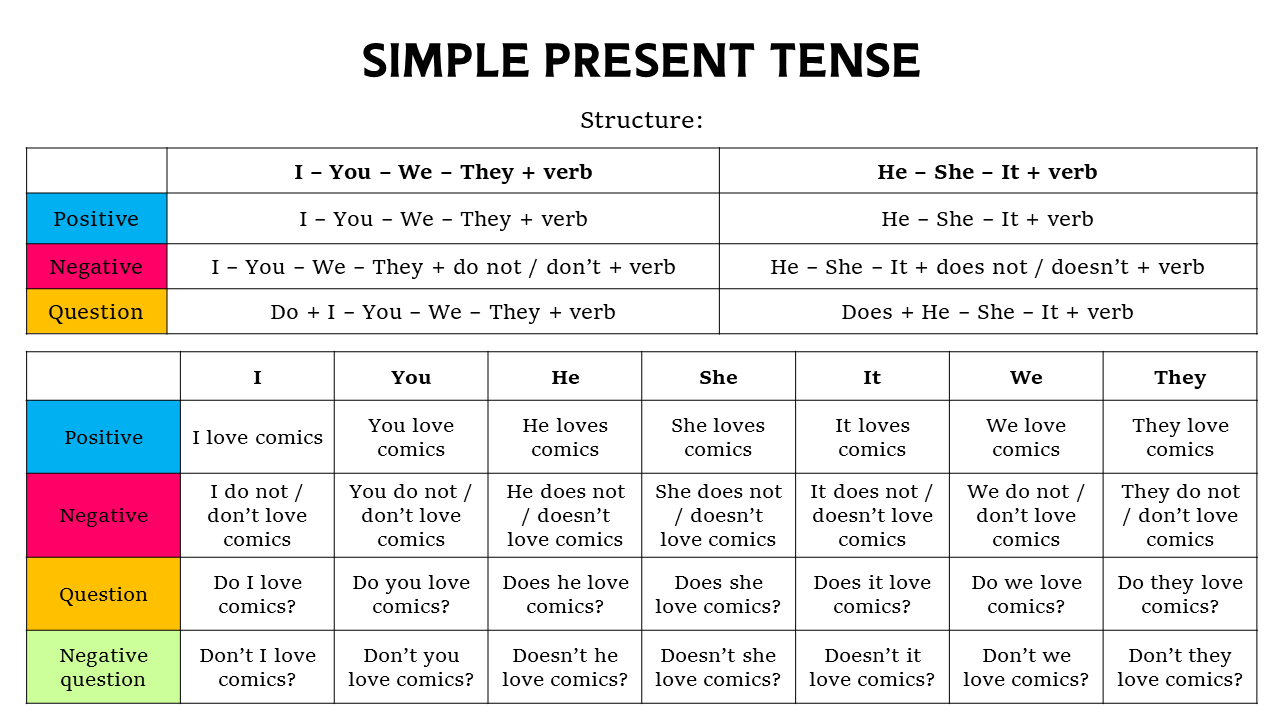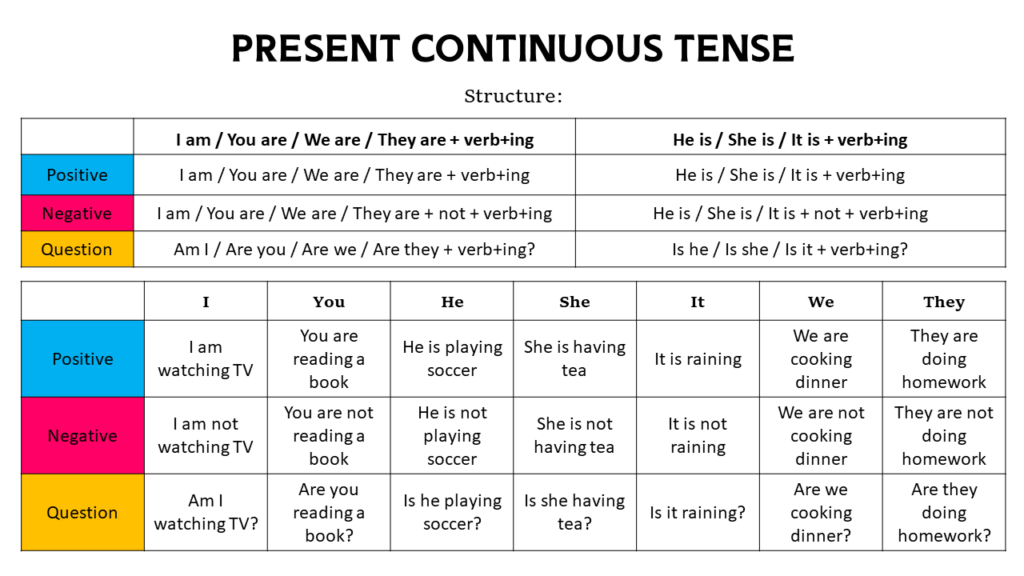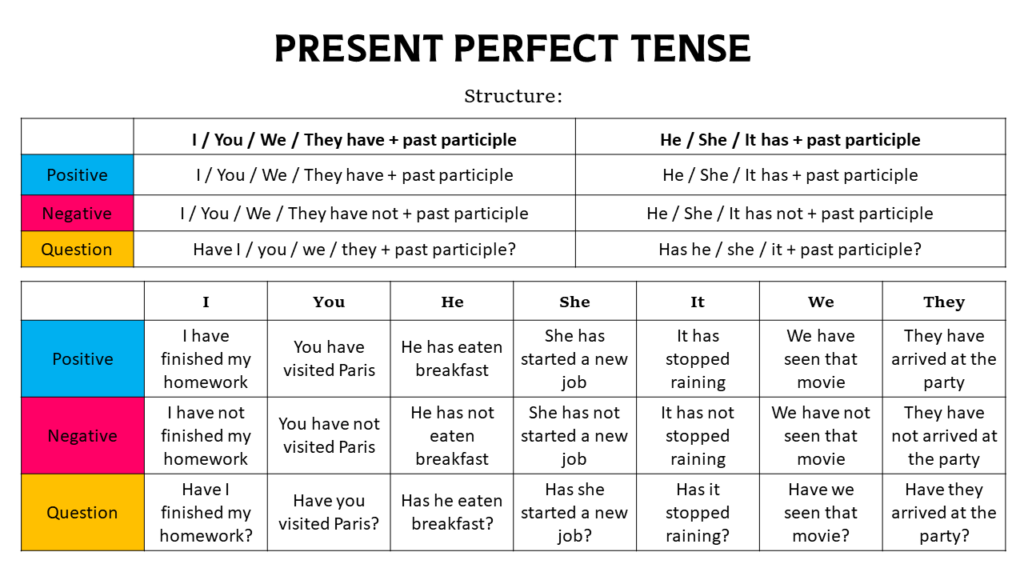The simple present tense is a verb tense used to describe habits, unchanging situations, general truths, and fixed arrangements. It’s the most basic form of the present tense, expressing actions that are currently happening or routines that occur regularly.
Formula/Structure
The simple present tense is straightforward in its construction, adhering to the base form of the verb for most subjects. However, when the subject is he, she, or it, an -s or -es is added to the verb. Here are some examples to illustrate this:
- I/You/We/They play football on weekends.
- He/She/It plays football on weekends.
For verbs that end in -y preceded by a consonant, the -y is replaced with -ies:
- I/We/You/They study every day.
- He/She/It studies every day.
Rules with Examples
- Use the base form of the verb: “She drinks coffee every morning.”
- Add -s or -es for he/she/it: “He watches TV in the evening.”
- For verbs ending in -y after a consonant, change -y to -ies: “The baby cries at night.”
How to Make Simple Present Tense?
1. Positive Simple Present Tense
To construct a positive sentence in the simple present, use the subject followed by the base form of the verb (add -s or -es for he/she/it). For example:
- “They play tennis on Fridays.”
- “She enjoys reading.”
2. Negative Simple Present Tense
To make a sentence negative, introduce “do not” or “does not” (for he/she/it) before the base form of the verb:
- “I do not like spicy food.”
- “He does not go to the gym.”
3. Interrogative Simple Present Tense
For questions, invert the subject and the auxiliary do/does, followed by the base form of the verb:
- “Do you like Italian cuisine?”
- “Does she know how to swim?”
Examples of Simple Present Tense
Examples of Positive Simple Present Tense
- She reads a book before bedtime every night.
- The sun rises in the east.
- Dogs bark when they see strangers.
- The store opens at 9 AM every day.
- My brother plays soccer on weekends.
- The garden looks beautiful in the spring.
- Our teacher explains the lessons very clearly.
- The train leaves at 6 PM sharp.
- He loves to cook Italian dishes.
- Birds fly south for the winter.
Examples of Negative Simple Present Tense
- I do not watch TV on weekdays.
- She doesn’t eat meat or dairy products.
- The museum does not open on Mondays.
- They do not like to wake up early.
- He doesn’t understand the importance of this meeting.
- We do not go to the beach during the winter.
- The baby doesn’t sleep through the night yet.
- Our car does not have air conditioning.
- You do not need to bring anything to the party.
- The bus doesn’t stop here after 8 PM.
Examples of Interrogative Simple Present Tense
- Do you know how to swim?
- Does she speak French fluently?
- Do they have any pets?
- Does the library close at 6 PM?
- Do we need to bring our own laptops?
- Does he enjoy playing the guitar?
- Do you believe in ghosts?
- Does this phone come with a warranty?
- Do they serve breakfast all day?
- Does it rain a lot in April?

Simple Present Tense Exercise
Below are 10 questions designed to test your understanding and application of the simple present tense. Try to complete them before checking the answers provided.
Questions
- She (to sing) in the choir every Sunday.
- They (not to watch) TV in the mornings.
- (you to have) a pet at home?
- The sun (to rise) in the east.
- Cats (not to like) water.
- How often (he to go) to the gym?
- The library (to open) at nine o’clock in the morning.
- My best friend (not to enjoy) playing video games.
- (your parents to live) in the city?
- Birds (to fly) south for the winter.
Answers
- She sings in the choir every Sunday.
- They do not watch TV in the mornings.
- Do you have a pet at home?
- The sun rises in the east.
- Cats do not like water.
- How often does he go to the gym?
- The library opens at nine o’clock in the morning.
- My best friend does not enjoy playing video games.
- Do your parents live in the city?
- Birds fly south for the winter.


